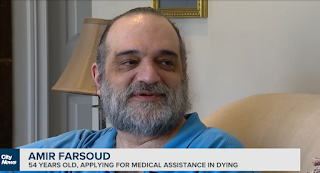Alex Schadenberg
Executive Director, Euthanasia Prevention Coalition
The Office of the Chief Coroner of Ontario released the October 2022 MAiD data which indicates that there were 3213 reported assisted deaths in the first ten months of 2022 which exceeds the 3102 in 2021. There have been 13,011 reported assisted deaths in Ontario since euthanasia was legalized.
The October 2022 Ontario data also showed a significant increase with 334 reported assisted deaths as compared to 299 in October 2021.
The growth in killing by lethal injection continues. According to the data:
.jpg)
Jan 1 - June 30, 2020 (1127 reported assisted deaths),
July 1 - Dec 31, 2020 (1251 reported assisted deaths),
Jan 1 - June 30, 2021 (1363 reported assisted deaths),
Jan 1 - June 30, 2021 (1363 reported assisted deaths),
July 1 - Dec 31, 2021 (1739 reported assised deaths),
Jan 1 - June 30, 2022 (1822 reported assisted deaths),
July 1, 2022 - Oct 31, 2022 (4 months 1391 reported assisted deaths)
There will likely be, in 2022, more than 2000 reported assisted deaths in the second half of the year and more than 3800 assisted deaths by year end.
The trends in Ontario mirror the national trends.
Health Canada released the Third Annual Report on Medical Assistance in Dying in Canada (2021) in July 2022. According to the Third Annual report there were:
10,064 assisted deaths in 2021 up from 7603 in 2020, 5661 in 2019, 4480 in 2018, 2838 in 2017 and 1018 in 2016. The report indicated that in 2021 the number of assisted deaths increased by 32.4% representing 3.3% of all deaths with the total number of reported (MAiD) assisted deaths in Canada from legalization until December 31, 2021 at 31,664.
The report data is submitted by the medical or nurse
practitioners who carried out the euthanasia death. There is no
requirement that a third party or neutral person submit the reports to
ensure accuracy.
Is there enough killing yet?
Canada's federal government established a committee to discuss further expansions of euthanasia in Canada. This committee is considering euthanasia for incompetent people who requested death in their advanced directive, euthanasia for children and the rules to implement euthanasia for people with mental illness alone. Bill C-7 already approved euthanasia for mental illness.
A recent presentation by the Quebec College of Physicians urged the federal government to permit infant euthanasia, also known as infanticide.
There have been many media stories indicating that Canadians are now dying by euthanasia for reasons of poverty, disability, and mental illness.
Thousands of deaths means that there are thousands of stories. We need you to tell your story. Some of the people were depressed and had questionable competency. Some of these people were subtly coerced. Some of these stories are known by you. We can effectively challenge the culture but we need your stories.
Contact Alex Schadenberg at the Euthanasia Prevention Coalition at: info@epcc.ca or 1-877-439-3348.
Links to euthanasia stories in Canada:
- Veterans affairs worker advocates euthanasia for PTSD (Link).
- Canadian man claims that he was pressured to request euthanasia (Link).
- Why did they kill my brother (Link).
- Manitoba woman died by euthanasia based on inadequate home care (Link).
- Quebec man seeks euthanasia based on changes to home care (Link).
- Alberta man requests euthanasia based on poverty (Link).
- Ontario man approved for euthanasia because he can't get medical treatment (Link).
- Shopping for doctor death in Canada (Link).
- Gwen is seeking euthanasia because she can't access medical treatment (Link).
- Euthanasia for disability and poverty (Link).
- Euthanasia for Long Covid and poverty (Link).
- Canada's MAiD law is the most permissive in the world. (Link).




.jpg)





.JPG)











